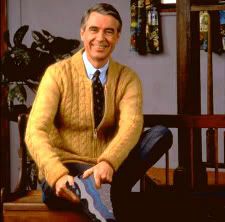Mr. Rogers: Public Enemy Number 1?
 Could the old guy in the cardigan -- come on, isn't that how you thought of him? -- really be Public Enemy #1? Or at least in the top 10?
Could the old guy in the cardigan -- come on, isn't that how you thought of him? -- really be Public Enemy #1? Or at least in the top 10?Let me back up a week or so. Incredible Wife and I were driving somewhere when she brought up some murder case or another -- her fascination; I don't get it. I mentioned that the murderer certainly wasn't suffering for a shortage of self-esteem.
"What does high self-esteem have to do with it? I think he was probably suffering from very low self-esteem," she answered.
I went on to explain a Dennis Pragerism that I think is spot on: That the indoctrination of self-esteem has gotten out of hand, and at its worst is the murder who kills because whatever he wants is more important than the very life of the person he murders.
In today's WSJ, Jeff Zaslow says the same thing, blaming the up-and-coming generation's sense of entitlement on the guy in cardigan.
Don Chance, a finance professor at Louisiana State University, says it dawned on him last spring. The semester was ending, and as usual, students were making a pilgrimage to his office, asking for the extra points needed to lift their grades to A's.
"They felt so entitled," he recalls, "and it just hit me. We can blame Mr. Rogers."
Fred Rogers, the late TV icon, told several generations of children that they were "special" just for being whoever they were. He meant well, and he was a sterling role model in many ways. But what often got lost in his self-esteem-building patter was the idea that being special comes from working hard and having high expectations for yourself.
Now Mr. Rogers, like Dr. Spock before him, has been targeted for re-evaluation. And he's not the only one. As educators and researchers struggle to define the new parameters of parenting, circa 2007, some are revisiting the language of child ego-boosting. What are the downsides of telling kids they're special? Is it a mistake to have children call us by our first names? When we focus all conversations on our children's lives, are we denying them the insights found when adults talk about adult things?
Some are calling for a recalibration of the mind-sets and catch-phrases that have taken hold in recent decades. Among the expressions now being challenged: "You're special."
Other phrases that should be dustbin-bound: "They're just children," "Call me Cindy" (parents on a first-name basis), "Tell me about your day." Instead, parents should act like adults around kids and let the kids see what adults do, what they talk about, what's on their minds -- not an endless discussion of who's going to get them to soccer practice.
This astute professor notes that Asian students who grew up without Mr. Rogers and the culture of self-esteem see a B or a C as a grade they deserved because it was given by someone older and more knowledgeable than they. They see it as a motivator to do better, to work harder.
By contrast, American students often view lower grades as a reason to "hit you up for an A because they came to class and feel they worked hard," says Prof. Chance. He wishes more parents would offer kids this perspective: "The world owes you nothing. You have to work and compete. If you want to be special, you'll have to prove it."Amen. But what do you think there's any chance that the liberal bastion of children's TV and children's books will do anything about it?
"Hey, kid. Welcome to my neighborhood. Hang up my jacket and get me my cardigan."
Labels: America, Education, Self-esteem




<< Home